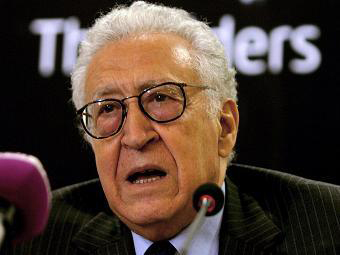The Joint Special Envoy of the United Nations and the League of Arab States for the Syrian Crisis, Lakhdar Brahimi, is showing no signs of readiness to convene the third round of Syria talks, Russian Permanent Representative to the United Nations Vitaly Churkin said on Thursday, April 3, ITAR-TASS reported.
"Brahimi is continuing his work and consultations and is showing no readiness to convene the third round of talks," he said.
Russian Foreign Ministry spokesman Alexander Lukashevich said earlier in the day that the agenda of the third round had already been agreed and included a set of issues such as an end to violence, the fight against terrorism, the formation of a transitional governing body with the participation of representatives from the Syrian government and different segments of the Syrian political opposition, and other tasks arising out of the Geneva Communique of June 20, 2012.
The second round of the talks ended in Geneva on February 11, 2014. The discussions were expected to resume in March, but the international envoy has so far been unable to convince the sides to get back to the negotiating table.
The second round of inter-Syrian talks ended officially in Geneva on February 15, and the parties are set to continue their discussions, but the date of the next round has yet to be agreed.
Brahimi said the agenda of the next round had been agreed and consisted of four points: violence and terrorism, a transitional governing body, national institutions, national reconciliation, and a national dialogue.
He said the last session of the second round was "as laborious as all the meetings we have had, but we agreed on an agenda for the next round when it does take place."
Brahimi admitted that "these two rounds have not come out with very much."
Brahimi stressed that "failure is always staring at us in the face. As far as the United Nations is concerned we will certainly not leave one stone unturned if there is a possibility to move forward. If there isn't, we will say so."
Brahimi, urged the U.N. Security Council to show support for the Syrian talks to make their new round more productive. He said the international community would like to continue the Geneva talks but needed the help and support of the Security Council to ensure that their new round is more productive than the previous two.
The goal of the international conference on Syria is to achieve a political solution to the three-year-long conflict through a comprehensive agreement between the two sides for the full implementation of the Geneva communique, adopted after the first international meeting on the issue on June 30, 2012, and since endorsed by the U.N. Security Council.
The communique lays out key steps in a process to end the violence. Among others, it calls for the establishment of a transitional governing body, with full executive powers and made up by members of the present Government and the opposition and other groups, as part of agreed principles and guidelines for a Syrian-led political transition.
On March 12, U.N. Secretary-General Ban Ki-moon called for renewed political efforts to end what he described as the biggest humanitarian and security crisis in the world.
He believes that "only a political solution will end the nightmare of the Syrian people." Ban urged Russia and the United States, as the initiating states of the Geneva Conference on Syria, "to take clear steps to re-energise the Geneva process".
The basis of those talks is full implementation of an action plan adopted in the Geneva Communique of 2012, the first international conference on the conflict, which calls for setting up a transitional government that should then lead the country to free and fair elections.
Well over 100,000 people have been killed and an estimated 9 million others driven from their homes.






